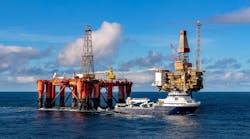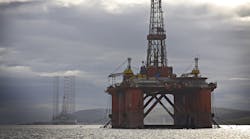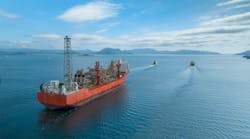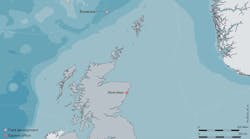By Jeremy Beckman, London editor
STAVANGER, Norway — Equinor and Ithaca Energy have committed to invest £3.8 billion ($4.62 billion) in Phase 1 of the Rosebank oil and gas project 130 km northwest of Shetland, after securing approval from the UK’s North Sea Transition Authority.
This will be Britain’s deepest-water development to date, in about 1,100 m of water. Rosebank, discovered by Chevron, contains estimated recoverable resources of about 300 MMbbl of oil; Phase 1 will target 245 MMbbl.
Rosebank’s subsea wells will be tied back to a redeployed FPSO, Petrojarl Knarr, which formerly operated for Shell for seven years on the Knarr Field in the Norwegian sector. The vessel will have the capacity to produce about 70,000 bbl/d of oil and more than 21 MMcf/d of gas.
Following the planned startup in 2026-2027, the produced oil will be transported via shuttle tankers to refineries while the gas will head through the West of Shetland pipeline system to mainland Scotland.
The FPSO has been designed to be electrification-ready. Equinor and partner Ithaca Energy are working with the UK government and industry on a regional solution for power from shore to Rosebank and other nearby fields to minimize carbon emissions from production.
TechnipFMC has an integrated engineering, procurement, construction and installation (iEPCI) contract to provide the subsea production systems, umbilicals, risers and flowlines, with an estimated value of about $500 million for the local content components. The company will oversee project management and engineering activities mainly from Aberdeen with the tree systems manufactured in Dunfermline, central Scotland. Its complex in Newcastle, northeast England, will manufacture the umbilicals, and its Evanton site in northeast Scotland will fabricate the pipelines.
Other UK fabrication locations will contribute to the project, and the main vessel mobilization site will also be in the UK.
Odfjell Drilling has a $328 million contract for the development drilling, including integrated services, modifications and options. The Deepsea Atlantic semisub should start work on the initial seven wells in second-quarter 2025, with four single-well options in the contract.
According to the company, the vessel—built by Samsung Heavy Industries in 2014—is modern in design, and it was constructed to allow for electrification to reduce CO2 emissions with additional features such as a vapor recovery system and a closed flare. It also has available space allocated for electrical equipment in its mooring turret and on deck.
The vessel is at Drydocks World in Dubai undergoing life extension work, modifications for the field specifics and enhanced energy efficiency, and preparations to make it electrification-ready. With electrification, Equinor estimates that Rosebank’s lifetime upstream CO2 intensity will decrease from 12 kg to about 3 kg CO2/boe.
More new projects needed
Industry association Offshore Energies UK (OEUK) has welcomed news of the development, noting that its planned oil production capacity is equivalent to 8% of the UK’s entire output between 2026 and 2030.
The association also cited a report by Wood Mackenzie and Voar Energy, which estimated that the project could generate £8.1 billion ($9.84 billion) of total direct investment over the lifetime of the field, of which 78% is likely to be in UK-based businesses, with 1,600 jobs in the local supply chain set to be directly employed in the development at the height of the construction phase.
However, over its lifetime, Rosebank will only meet eight months’ worth of UK demand, the association cautioned, with more new projects needed in UK waters to manage reliance on imported oil and gas as UK North Sea production declines.
OEUK’s recent economic report claimed that about £100 billion ($121.4 billion) of investment planned in offshore energy this decade in the UK has yet to be approved. Britain’s recent offshore wind auction attracted no bidders, with businesses seeking greater assurances over the UK’s long-term energy policies to commit to costly new developments.
OEUK CEO David Whitehouse said, “We have around 283 fields in the North Sea, but over 180 of those will stop producing within the next decade. If these are not replaced, we will import 80% of the oil and gas the UK will need at a higher cost to the consumer, our economy and ultimately the climate…
“The bulk of companies investing in opportunities like floating offshore wind, hydrogen, carbon capture and storage, and decarbonizing our economy require the cashflow from a stable and predictable oil and gas business to fund these opportunities.
“Our latest Economic Report found £35 billion [$42.5 billion] could be spent in the next decade on offshore oil and gas projects, but businesses need renewed certainty to sign off. This announcement is a step in the right direction, but more needs to be done to secure the private investment that underpins the jobs for our home-grown energy future.”
09.27.2023










